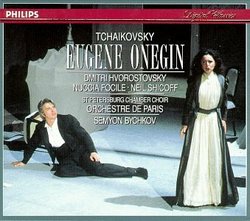| All Artists: Pyotr Il'yich Tchaikovsky, Semyon Bychkov, Dmitri Hvorostovsky, Nuccia Focile, Neil Shicoff, Irina Arkhipova, Herve Hennequin, Francis Egerton Aleksandr Anissimov, Orchestre de Paris, St Petersburg Chamber Choir Title: Tchaikovsky - Eugene Onegin / Hvorostovsky · Focile · Shicoff · Borodina · Arkhipova · Orchestre de Paris · Bychkov Members Wishing: 0 Total Copies: 0 Label: Philips Release Date: 2/15/1994 Genre: Classical Style: Opera & Classical Vocal Number of Discs: 2 SwapaCD Credits: 2 UPC: 028943823524 |
Search - Pyotr Il'yich Tchaikovsky, Semyon Bychkov, Dmitri Hvorostovsky :: Tchaikovsky - Eugene Onegin / Hvorostovsky · Focile · Shicoff · Borodina · Arkhipova · Orchestre de Paris · Bychkov
 | Pyotr Il'yich Tchaikovsky, Semyon Bychkov, Dmitri Hvorostovsky Tchaikovsky - Eugene Onegin / Hvorostovsky · Focile · Shicoff · Borodina · Arkhipova · Orchestre de Paris · Bychkov Genre: Classical
|
Larger Image |
CD Details |
Member CD ReviewsReviewed on 8/14/2007... 2 disc box set with a booklet including 70 pages of background information on the composer, the operatic work and its performers, with some small illustrations. In addition, the booklet contains translation ("transliteration") of what seems to be the complete libretto (lyrics and dialogue) from its original Russian into English, German, and French. Lastly in the booklet is another translation, this one to Italian. Obviously a premium package.
CD ReviewsSublime Tchaikovsky D. MCGOVERN | New Zealand | 11/21/2001 (5 out of 5 stars) "I adore this recording of Tchaikovsky's greatest opera. Everything about it is absolutely top-notch: the cast, the conducting and the sound quality.Eugene Onegin is a highly melodic opera - much more so, in fact, than The Queen of Spades, Tchaikovsky's other operatic masterpiece. And while it has its big moments, Eugene Onegin is a much more reflective work with its own quiet and magical charm. It's an opera that grows on the listener very quickly, with its intensely personal melodies, and superbly rounded characterizations of its three central protagonists.Dmitri Hvorostovsky, as Alejandra Vernon has pointed out in her excellent review, is a wonderful Eugene Onegin. The darkness in his voice is essential to projecting his inner turmoil, but there is also sympathy there as well in his mellow timbre. Too many run-of-the-mill Onegins sound one-dimensional (ie angry all the time). Hvorostovsky makes him startlingly real, and our appreciation of his plight is all the more keenly felt because we understand his weaknesses. I share Ms Vernon's hope that we will one day be able to see a filmed performance of Hvorostovsky in this role.Nuccia Focile is an excellent Tatyana, despite a slight inclination to shrillness at the very top of her voice. Her Letter Scene is movingly sung, and her final duet with Hvorostovsky is thrilling in its intensity.Neil Shicoff is equally intense in his heartfelt Kuda, Kuda and the lead-up to his duel with Onegin is riveting and terrifying at the same time. The recording brings out a slight grittiness in his voice, but this is nevertheless an attractive performance. His wooing of Olga (Olga Borodina) in the gorgeous Ya Lyublyu Vas in Act 1 is suitably romantic and sweet.With a great supporting cast and chorus, and inspired conducting from Semyon Bychnov, this is a recording to treasure." A match made in heaven Alejandra Vernon | Long Beach, California | 02/04/2001 (5 out of 5 stars) "Could there ever be a better Onegin ? The exquisite dark honey baritone, the Russian soul, and as a bonus, stunning looks that are perfect for the part. In what is like a fated "character meets performer", Dmitri Hvorostovsky IS Eugene Onegin. One can only hope that someday his performance will be filmed.Nuccia Focile as Tatyana, and Olga Borodina as Olga, are superb, and Neil Shicoff is remarkable. He brings so much sensitivity and emotion to the part of Lensky it's a rare experience to listen to, and under the baton of Semyon Bychkov, every scene is performed to perfection.There are many sections that are wonderful in this opera, but the best of the best has to be Lensky's aria, "Kuda, Kuda". One of the loveliest melodies ever written, and here sung with a tenderness that's heartbreaking and uplifting at the same time. If you dislike this type of music, just listen to this one aria (disc 2, track 7), and experience opera at its most glorious...you may find yourself enjoying it. This box set is well put together with a 268 page booklet that contains a brief history, synopsis, biographies, and libretto in four languages, and the total time for both discs is 2 hours and 20 minutes.For my taste, this is Tchaikovsky's supreme masterpiece. Based on Pushkin's tragic tale of unrequited and denied love, it's Russian to the core. Oh ! The passion, the torment, the beauty of it all..."
|

 Track Listings (15) - Disc #1
Track Listings (15) - Disc #1